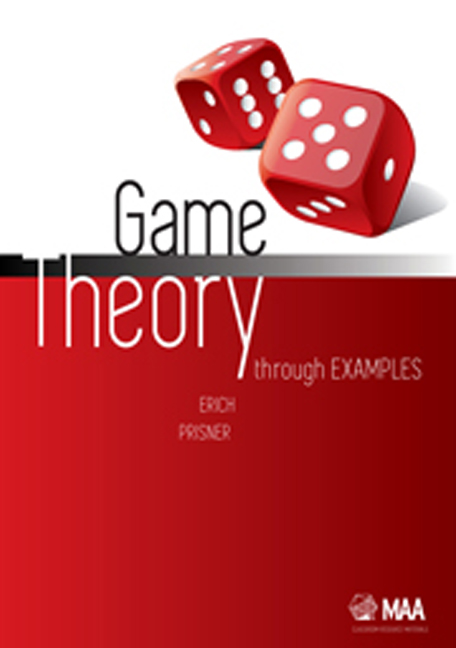Book contents
- Frontmatter
- Contents
- Preface
- 1 Theory 1: Introduction
- 2 Theory 2: Simultaneous Games
- 3 Example: Selecting a Class
- 4 Example: Doctor Location Games
- 5 Example: Restaurant Location Games
- 6 Using Excel
- 7 Example: Election I
- 8 Theory 3: Sequential Games I: Perfect Information and no Randomness
- 9 Example: Dividing A Few Items I
- 10 Example: Shubik Auction I
- 11 Example: Sequential Doctor and Restaurant Location
- 12 Theory 4: Probability
- 13 France 1654
- 14 Example: DMA Soccer I
- 15 Example: Dividing A Few Items II
- 16 Theory 5: Sequential Games with Randomness
- 17 Example: Sequential Quiz Show I
- 18 Las Vegas 1962
- 19 Example: Mini Blackjack and Card Counting
- 20 Example: Duel
- 21 Santa Monica in the 50s
- 22 Theory 6: Extensive Form of General Games
- 23 Example: Shubik Auction II
- 24 Theory 7: Normal Form and Strategies
- 25 Example: VNM POKER and KUHN POKER
- 26 Example: Waiting for Mr. Perfect
- 27 Theory 8: Mixed Strategies
- 28 Princeton in 1950
- 29 Example: Airport Shuttle
- 30 Example: Election II
- 31 Example: VNM POKER(2, r, m, n)
- 32 Theory 9: Behavioral Strategies
- 33 Example: Multiple-Round Chicken
- 34 Example: DMA Soccer II
- 35 Example: Sequential Quiz Show II
- 36 Example: VNM POKER(4, 4, 3, 5)
- 37 Example: KUHN POKER(3, 4, 2, 3)
- 38 Example: End-of-Semester Poker Tournament
- 39 Stockholm 1994
- Bibliography
- Index
Preface
- Frontmatter
- Contents
- Preface
- 1 Theory 1: Introduction
- 2 Theory 2: Simultaneous Games
- 3 Example: Selecting a Class
- 4 Example: Doctor Location Games
- 5 Example: Restaurant Location Games
- 6 Using Excel
- 7 Example: Election I
- 8 Theory 3: Sequential Games I: Perfect Information and no Randomness
- 9 Example: Dividing A Few Items I
- 10 Example: Shubik Auction I
- 11 Example: Sequential Doctor and Restaurant Location
- 12 Theory 4: Probability
- 13 France 1654
- 14 Example: DMA Soccer I
- 15 Example: Dividing A Few Items II
- 16 Theory 5: Sequential Games with Randomness
- 17 Example: Sequential Quiz Show I
- 18 Las Vegas 1962
- 19 Example: Mini Blackjack and Card Counting
- 20 Example: Duel
- 21 Santa Monica in the 50s
- 22 Theory 6: Extensive Form of General Games
- 23 Example: Shubik Auction II
- 24 Theory 7: Normal Form and Strategies
- 25 Example: VNM POKER and KUHN POKER
- 26 Example: Waiting for Mr. Perfect
- 27 Theory 8: Mixed Strategies
- 28 Princeton in 1950
- 29 Example: Airport Shuttle
- 30 Example: Election II
- 31 Example: VNM POKER(2, r, m, n)
- 32 Theory 9: Behavioral Strategies
- 33 Example: Multiple-Round Chicken
- 34 Example: DMA Soccer II
- 35 Example: Sequential Quiz Show II
- 36 Example: VNM POKER(4, 4, 3, 5)
- 37 Example: KUHN POKER(3, 4, 2, 3)
- 38 Example: End-of-Semester Poker Tournament
- 39 Stockholm 1994
- Bibliography
- Index
Summary
Welcome to game theory, the mathematical theory of how to analyze games and how to play them optimally. Although “game” usually implies fun and leisure, game theory is a serious branch of mathematics. Games like blackjack, poker, and chess are obvious examples, but there are many other situations that can be formulated as games. Whenever rational people must make decisions within a framework of strict and known rules, and where each player gets a payoff based on the decisions of all the players, we have a game. Examples include auctions, negotiations between countries, and military tactics. The theory was initiated by mathematicians in the first half of the last century, but since then much research in game theory has been done outside of mathematics.
This book gives an introduction to game theory, on an elementary level. It does not cover all areas of a field that has burgeoned in the last sixty years. It tries to explain the basics thoroughly, so that it is understandable for undergraduates even outside of mathematics, I hope in an entertaining way. The book differs from other texts because it emphasizes examples. The theory is explained in nine theory chapters, and how it is applied is illustrated in twenty-four example chapters, where examples are analyzed in detail. Each example chapter uses tools developed in theory chapters.
Audience
The text can be used for different purposes and audiences. It can be used by students of economics, political science, or computer science. Undergraduate mathematics students should enjoy the book as well and profit from its approach. The book may also be used as a secondary text, or for independent study, as its many concrete examples complement expositions of the theory.
Information
- Type
- Chapter
- Information
- Game Theory Through Examples , pp. xvi - xxPublisher: Mathematical Association of AmericaPrint publication year: 2014
